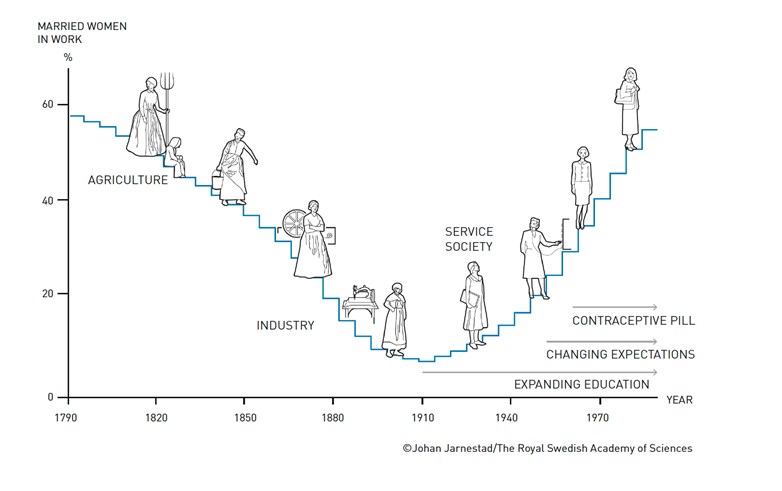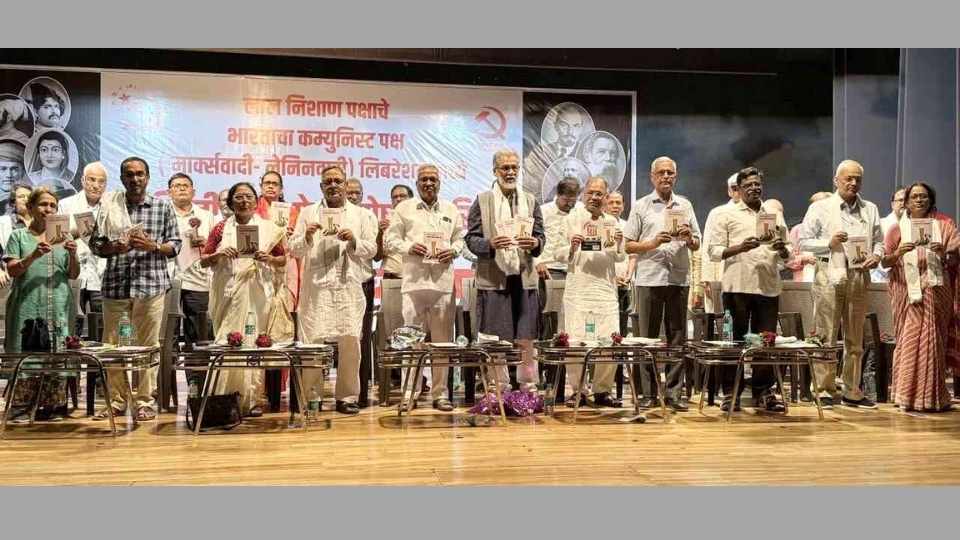Her work fits the standard stage-ist theories of capitalist development but brings out the differential impacts on women by theorising a U shaped relationship between economic growth and women’s labour force participation. Simply put, at lower level of economic growth (typically called underdevelopment) women’s participation is higher in the labour force and as economic growth picks up it reduces women’s participation in the labour force. In the typical development literature, the shift is sectoral, i.e. from agriculture to industry. So women are largely employed in agriculture when there is low levels of development and when economic growth entails a shift to manufacturing and industrial jobs their participation is found to be lower. In economics this is termed the income effect, i.e. when the household or family income increases there is a withdrawal of women from the labour force.
Political economic analysis posits this as the forced sexual division of labour or what Maria Mies had termed “housewifisation”. Silvia Federici analysed the role of the witch hunts in early stages of capitalism, which were used to subjugate and force women to withdraw from the labour force and become imprisoned inside the households. This violent history of capitalism, the institution of private property rights and the primacy of the nuclear family could be expected to lead to such differential gender outcomes over time. Goldin’s work uses innovative techniques to bring to light this evidence of differential labour market outcomes, especially since US labour force data mostly collected data on men but falls short of linking it to the broader processes of capitalist accumulation.
The other interesting insight from Goldin’s work is that when economic growth increases further and there is a sectoral shift to services from industry, women’s participation again increases in white-collared jobs. But there is a catch - when service sector starts expanding, especially in finance and corporate jobs, then men find more employment in these kind of jobs. These jobs are what Goldin terms “greedy jobs” and they typically involve irregular hours of work and extremely flexible work schedules and hence higher pays. These kind of jobs are typically cornered by men as there is a disproportional burden of care work shouldered by women and they do not get access to these jobs. This again shows that women are forced to withdraw from the workforce even in white-collar jobs because of household duties especially care work. Again “greedy jobs” read in a political economic context shines light on a very important aspect of capitalist production which is the role of reproductive labour.
Reproductive labour in fact is the source of capitalist accumulation and keeps up the process of production. However care work is often unpaid and this is the gendered division of labour and contemporary capitalism. Goldin’s work throws light on the statistical evidences, but her analyses shies away from pinning these on capitalist accumulation. What one can only hope is that the Noble prize in 2023 will spur interest in research into these very processes of capitalist accumulation that keep women shackled. It also brings to light one of the crucial aspects that capitalism does not want us to see, which is that capitalism is not blind to identities. Goldin’s work most importantly points to the fact that capitalism uses identities and differences to expand profit shares and power. From wage gaps in the same job, to disallowing women to rise within an organization of sector which is called “glass ceilings”, or the keeping down of women in certain jobs otherwise called “sticky floors” – these are regular and recurring features of contemporary capitalism. Most importantly, that the labour market under capitalism actually discriminates and the statistical data enterprise invisibilises this by refusing to count women's contribution in the economy since it is mostly unpaid.
What it hides however is the forced nature of this transaction in which women are forced to accept jobs which are unpaid or have to undertake work which is expanding on their reproductive capacities like care work and domestic work, i.e. household work most of which is unpaid. So Mr. Breadwinner actually does not exist without Mrs. Housewife. The horrific witch hunts of the early stages of capitalism in fact point to the fact that primitive accumulation actually dispossesses women from participating in the labour force needs to be highlighted even further. Additionally, the institution of private property rights and the social construction of the nuclear family was designed to keep women in such a situation.
That this sexual division of labour is not natural and actually a social construct which is necessary for capitalist accumulation needs to be given far more attention and this will hopefully open up new vistas of research and give new impetus to movements which want to bring about an alternative world. After all shackling half the workforce to accommodation techniques of patriarchy and capitalism will not lead to a better world and one can only hope that this year's Noble prize keeps alive the dream of liberation. After all, women have nothing to lose but their chains.





